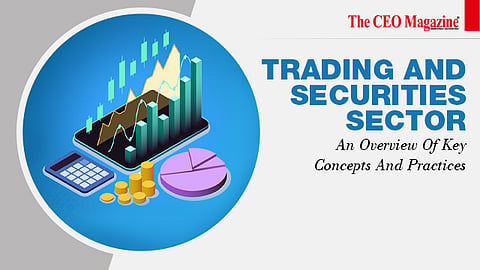

Trading And Securities Sector
The trading and securities sector is a crucial component of the global financial system, encompassing a range of activities related to buying, selling, and exchanging financial instruments such as stocks, bonds, options, and futures.
This sector is essential for capital formation, enabling companies to raise funds through the issuance of securities and for investors to allocate their wealth and manage risk.
This article will provide an overview of the key concepts and practices related to the trading and securities sector, including the types of financial instruments, market participants, trading strategies, and regulations.
The trading and securities sector includes various financial instruments, each with unique characteristics and risks. Some of the most commonly traded instruments include stocks, bonds, options, and futures.
Stocks, also known as equities, represent ownership in a company and offer investors a share in the company's profits and losses. Stocks are traded on stock exchanges, and their prices are determined by supply and demand.
On the other hand, bonds are debt instruments that represent a loan from an investor to a borrower, typically a corporation or government entity. The borrower pays interest to the investor over the life of the bond, and the bond is redeemed at maturity.
Options are contracts that give the buyer the right, but not the obligation, to buy or sell an underlying asset at a predetermined price within a specified period. Options are commonly used to hedge risk or speculate on price movements.
Futures are similar to options in that they are contracts that obligate the buyer to purchase or sell an underlying asset at a predetermined price and time. However, unlike options, futures contracts are binding and require the buyer and seller to fulfil their obligations.
The trading and securities sector involves a range of market participants, including individual investors, institutional investors, traders, brokers, dealers, and market makers. Each participant plays a unique role in the financial markets, contributing to price discovery and liquidity.
Individual investors are individuals who buy and sell securities for their own account, typically through a brokerage account. Institutional investors, such as pension funds, insurance companies, and hedge funds, manage large pools of capital and invest on behalf of their clients or shareholders.
Traders are individuals or firms that buy and sell securities with the goal of making a profit. Traders use a variety of strategies, including technical analysis, fundamental analysis, and quantitative analysis, to identify trading opportunities.
Brokers act as intermediaries between buyers and sellers, executing trades on behalf of their clients. Dealers, on the other hand, buy and sell securities for their own account, taking on market risk.
Market makers are specialised dealers who provide liquidity by buying and selling securities at quoted prices, helping to ensure that there is always a buyer or seller for a given security.
Trading strategies in the trading and securities sector vary widely depending on the goals and risk tolerance of the investor or trader. Some of the most common strategies include long-term investing, day trading, swing trading, and algorithmic trading.
Long-term investing involves buying and holding securities for an extended period, typically with the goal of generating capital gains and dividends.
Day trading involves buying and selling securities within a single trading day, with the goal of profiting from short-term price movements.
Swing trading involves holding securities for a few days to several weeks, taking advantage of medium-term price trends.
Algorithmic trading involves using computer algorithms to execute trades based on pre-programmed rules and parameters.
The trading and securities sector is subject to a wide range of regulations designed to ensure fair and transparent markets and protect investors from fraud and other abuses.
These regulations are enforced by various regulatory bodies, including the Securities and Exchange Commission (SEC) in the United States and the Financial Conduct Authority (FCA) in the United Kingdom.
Some of the key regulations in the trading and securities sector include the requirement for companies to disclose information to the public, restrictions on insider trading, and rules governing the conduct of market participants. Additionally, exchanges and other trading platforms must meet certain standards for transparency, fairness, and investor protection.
In recent years, the trading and securities sector has seen significant changes and innovations driven by technological advances, market structure changes, and new regulatory frameworks.
As the financial markets continue to evolve, it is essential for market participants to stay informed about the latest developments and best practices in this dynamic sector.
In conclusion, the trading and securities sector is a critical component of the global financial system, playing a vital role in capital formation, wealth allocation, and risk management. As outlined in this article, the sector involves a wide range of financial instruments, market participants, trading strategies, and regulations.
Understanding the key concepts and practices related to the trading and securities sector is essential for investors, traders, and other market participants to make informed decisions and navigate this complex and dynamic sector.
As the financial markets continue to evolve and innovate, it is essential for all stakeholders to stay informed and keep up with the latest developments and best practices in the trading and securities sector.
Follow us on Google News
